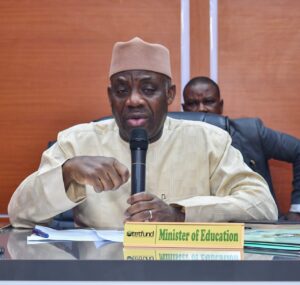
The Federal Ministry of Education, through the National Education Sector Renewal Initiatives (NESRI), has rolled out the revised Basic and Senior Secondary School Curricula. This rollout follows extensive nationwide consultations that brought every critical stakeholder to the table.
The review was led by the Nigerian Educational Research and Development Council (NERDC) under the supervision of the Ministry. It adopted both competency and outcome based approaches to strengthen the curricula.
The reform was not a rushed exercise but a step-by-step and participatory process designed to guarantee inclusivity, national ownership, and international relevance.
According to a statement signed by the Director, Press and Public Relations, Folasade Boriowo, the journey began with a nationwide needs assessment in 12 states to identify gaps in the system. It was followed by dialogues across the six geopolitical zones, where learners, teachers, parents, civil society groups, employers, religious and traditional leaders, policymakers, and development partners all contributed their perspectives. Their input helped shape a new curriculum framework that reflects national policies, development priorities, and the aspirations of society.
This framework was formally ratified at the 68th National Council on Education (NCE) meeting held on 10th October 2024.
The meeting, chaired by the Ministers of Education, also had in attendance Commissioners of Education, SUBEB chairmen, professional bodies, civil society organisations, and development partners, ensuring legitimacy and broad acceptance.
Curriculum design and development were carried out by subject specialists, teacher educators, industry practitioners, and curriculum experts across the country. The work followed four technical stages: content selection and standardisation, drafting, critique and refinement, and final editing.
Since the NCE approval, the Ministry has implemented the curricula in phases over the past nine months. This included piloting in selected schools, orientation for teachers, and nationwide training delivered both physically and online to prepare educators for effective delivery in classrooms.
The revised curricula combine competency and outcome based approaches to ensure learners are better prepared for the challenges of today and tomorrow. They are designed to meet Nigeria’s developmental needs while aligning with global standards. The details are available on the website of NERDC: www.nerdc.gov.ng
The Ministry assures Nigerians that, with due diligence observed and all stakeholders carried along, the revised curricula will continue to be implemented seamlessly across schools. Learners will be better equipped with the knowledge and skills they need to succeed and contribute meaningfully to national development.





Join the Conversation